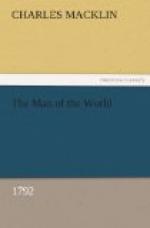Bet. [Aside, in great exultation.] So! I see he believes every word I say,—that’s charming. I’ll do her business for her I am resolved. [Exit.
Sid. What can this ridiculous creature mean by her dark walk,—her private spark, her kissing, and all her slanderous insinuations against Constantia, whose conduct is as unblamable as innocence itself? I see envy is as malignant in a paltry waiting wench, as in the vainest or most ambitious lady of the court.—It is always an infallible mark of the basest nature; and merit in the lowest, as well as in the highest station, must feel the shaft of envy’s constant agents—falsehood and slander.
Enter SAM.
Sam. Sir, Mr. Egerton and Miss Constantia desire to speak with you in the china room.
Sid. Very well, Sam. [Exit Sam.] I will not see them.—What is to be done? inform his father of his intended marriage,—no—that must not be;— for the overbearing nature and ambitious policy of Sir Pertinax would exceed all bounds of moderation; for he is of a sharp, shrewd, unforgiving nature.—He has banished one son already, only for daring to differ from his judgment concerning the merits of a Scotch and an English historian.— But this young man must not marry Constantia.—Would his mother were here! She, I suppose, knows nothing of his indiscretion:—but she shall, the moment she comes hither. I know it will offend him; no matter: it is our duty to offend,—when that offence saves the man we love from a precipitate action, which the world must condemn, and his own heart, perhaps, upon reflection, for ever repent: yes,—I must discharge the duty of my function, and of a friend,—though I am sure to lose the man, whom I intend to serve. [Exit.
END OF THE FIRST ACT.
ACT II. SCENE I.
Enter CONSTANTIA and EGERTON.
Con. Mr. Sidney is not here, sir.
Eger. I assure you I left him, and begged he would stay till I returned.
Con. His prudence, you see, sir, has made him retire; therefore we had better defer the subject till he is present; in the mean time, sir, I hope you will permit me to mention an affair that has greatly alarmed and perplexed me: I suppose you guess what it is.
Eger. I do not, upon my word.
Con. That is a little strange.—You know, sir, that you and Mr. Sidney did me the honour of breakfasting with me this morning in my little study.
Eger. We had that happiness, madam.
Con. Just after you left me, upon opening my book of accompts, which lay in the drawer of the reading desk, to my great surprise, I there found this case of jewels, containing a most elegant pair of ear-rings, a necklace of great value, and two bank bills in this pocket book, the mystery of which, sir, I presume you can explain.




